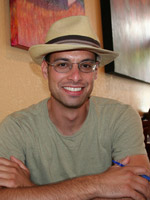Poems by Roger Real Drouin
Archives: by Issue | by Author Name

Wolf River
by Roger Real Drouin
From Canary Spring 2012
Roger lives about halfway between the Atlantic Ocean and the Loxahatchee Slough region of the Everglades Watershed, where he spends many afternoons hiking and photographing.

Oscar put the diesel in four-wheel-drive-low, and let it motor down the two-rutted trail into the valley, letting his thoughts wander also, back to being a kid fishing for trout in the river with his old man.
After three months, he knew the job, knew what to do from seven in the morning to four thirty, and most of the time he didn’t have to talk to the boss or anyone else. Jim would always be the one to pick up the two-way or to check in with the project manager when they had to. It would be easy to go on with it. But Oscar didn’t know if he could much longer.
He wasn’t sure he could endure the metal-cold feeling churning in his stomach every morning as he sat in the truck those two extra minutes before he stepped down onto the gravel, towards the clanging, metal-scratching constant buzzing. What would his Pap think of his job now, being sent out to pick up the first trout killed in these mountains by the small trace of carbon that seeped into the river?
“I know where it is,” Oscar said.
“OK.” Jim put the topo map up on the dash.
“You know to go right where it forks?”
“It’s not for a while.”
They passed into the white pines and the big ferns. The pines arched tall, blocking out the sun.
“Did you see Patterson’s new Rubicon?” Jim asked.
“Yeah, I saw it in the lot.”
“That’s a beautiful Jeep, man.”
Oscar knew his Pap would have understood. The old man would have known how his son felt in the morning, and he would have stood by him. Maybe Carla would understand too, like his Pap would have. She would—he hoped. Maybe it would be better after he did tell her. She might already know that he couldn’t do it any longer. She knew what kind of man he was. She could always read what he was really thinking.
But Jim, his old friend from high school, would think he was crazy. He’d probably start on about the pay. He’d remind him they were fixing to bring in eighty this year. Where the hell else can a blue-collar guy with no college education make half that pay? He’d mention Oscar’s old Ford, past the two-hundred-fifty-thousand mile mark, frame rusting through, and his two little girls—how there ain’t no work, nothing, out there. How six months ago, they were both taking unemployment for the first times in their lives.
A little past four p.m., Oscar sat in the truck. Jim was inside the trailer with the Conoco-Phillips sign talking to the boss.
Outside, the air was pale-copper and the wind splintered against the truck.
Jim walked out. With the smell of petroleum and sweat, he stepped up, the tattoos on his forearm, his dark hair and stubble on his face, and he leaned back in the vinyl. Was this really the same clean-cut boy who ran the eight hundred meters like a fox and had wanted to be a jet pilot, turning the track, leaning his lean frame, muscles in his legs patient, reaching, striving through the sprinkling March rain ten years ago? That was the kid who became the man sitting next to him.
“He says to go back tonight.”
“To the river?” Oscar asked.
“Yeah.”
So Oscar went home to have dinner with his wife and two girls. He kissed his wife, and she said she’d wait up for him. He told her to go to sleep, to get a good night’s rest, and he stepped out into the quiet night.
The lean, searching wolf stood on the river bank. The wolf, long-legged, big-eared, white-faced, looking into the water, sniffing the rocks. The wolf unaware of the two men above—their clumsy footsteps down the trail still too distant to hear. The wolf unaware of the machines and the invisible poison that would come and kill more fish. Old eyed, looking out, she heard the men now approaching, and she was gone, disappearing back into the pines.
By the river, it was easy for the two men to work under the full moon shining down like a spotlight erected for the constructions of men.
They placed thirteen dead fish into a black trash bag.
In the morning, the sun came through the blinds. Two girls came running in “Daddy. Wake up. Time for breakfast.”
His wife ducked in. “Girls. Leave dad alone. He was up late at work. He’ll be out soon.”
Oscar figured he should catch a few more minutes of sleep if he could, and when he closed his eyes all light faded from his retina into darkness. Then all he could see under his closed eyelids was the river running in a crimson blood red. He put his hand into the river turned thick, steam-hot crimson sludge.
This story first appeared in "CROSSTIMBERS: A Multicultural and Interdisciplinary Publication of the University of Science and Arts of Oklahoma Foundation.
© Roger Real Drouin